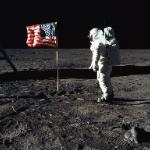Getting America Back to the Moon
 In recent months, the Obama administration has scrapped plans to return NASA to exploring the moon.
In recent months, the Obama administration has scrapped plans to return NASA to exploring the moon.
In recent months, the Obama administration has scrapped the Bush administration’s plan to get NASA back into manned exploration of the moon, and instead has focused on helping the private sector develop the ability to send cargo and, in due course, people into low orbit around the Earth.
That shift sparked a division among conservative space observers, between those who lamented the scaling-back of national ambition and those who welcomed the relatively free-market approach to orbit (and the refreshing contrast with the administration’s policies on Earth). There has been speculation that Obama may not really care about space policy — and perhaps better so than having him focus on it.
Obama’s effort to commercialize orbital services is laudable, whether or not he knows or cares what he’s doing. Lately, this push has encountered some resistance in Congress, though, and there is a danger that an overly NASA-centric approach to low-Earth orbit will prevail. It is only if commercial companies are allowed a major role that there will be a reliable capacity to not only get astronauts to the International Space Station but also to bring paying tourists into orbit in significant numbers as well.
What’s no less worrisome, however, is that a large, important celestial object has been eclipsed in current policymaking and political debate: the moon. Perhaps as a means of distancing itself as far as possible from the Bush approach, the Obama White House has discarded Earth’s natural satellite as a target for human exploration and development.
Consider these goals stated in the National Space Policy document, released in June: “By 2025, begin crewed missions beyond the moon, including sending humans to an asteroid. By the mid-2030s, send humans to orbit Mars and return them safely to Earth.” That “beyond the moon” is actually the only mention of the moon in the 14-page document.
During an April appearance with astronaut Buzz Aldrin, Obama gave the moon the presidential brush-off: “Now, I understand that some believe that we should attempt a return to the surface of the moon first, as previously planned. But I just have to say pretty bluntly here: We’ve been there before. Buzz has been there. There’s a lot more of space to explore, and a lot more to learn when we do.”
That statement is painfully ignorant, for two reasons: One, the moon emphatically has not been thoroughly explored just because a dozen astronauts (only one of them, Harrison Schmitt, a professional scientist) briefly visited a handful of landing sites there decades ago. As it happens, there’s a vast storehouse of scientific knowledge still waiting to be discovered on the moon, including data about the early solar system (preserved deep in the impact craters on the geologically inactive world). Also, any telescope placed on the moon’s far side would be uniquely positioned to peer into the universe.
Two, the moon offers not only a scientific payoff but a far broader economic and societal one. Consider some of the things that might be done there in the coming decades. Tourist ships might land on the moon’s surface or settle into lunar orbit (and earlier, remote-controlled rovers operated by paying customers on Earth could be a profitable business). Clean energy could be another lunar industry, with helium-3 fueling nuclear-fusion reactors, or solar arrays built from lunar material transmitting to Earth.
We don’t know what all the possibilities are. How might ceramics, say, develop in a low-gravity environment? What better place to store fragile or precious items than in an airless lunar cave?
What should the government be doing about such futuristic possibilities now? I suggest three things:
First, restore the moon as a target for civil space exploration. Let proposed lunar exploration missions compete, on grounds of scientific merit, with alternative proposals for asteroid exploration and such.
Second, extend the Obama emphasis on commercializing low-Earth orbit to the moon as well. NASA just took a small step in this direction by announcing a program to buy data from future private-sector lunar probes. Such incentives could also be part of future human exploration of the moon (and asteroids).
Third, develop a framework for eventual property rights on the moon. The Outer Space Treaty of 1967 prohibits claims of national sovereignty on celestial bodies, but does not ban private claims. One can imagine a system whereby governments would multilaterally recognize such claims (by entities that have, say, explored a lunar parcel to a specified degree of precision) without asserting sovereignty.
In short, we need a new space policy that doesn’t forget about the moon.